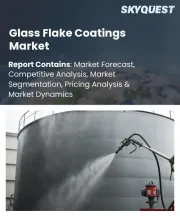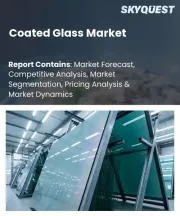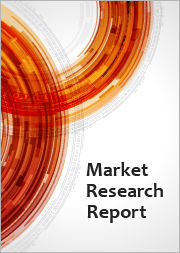
|
시장보고서
상품코드
1796923
판유리 코팅 시장 : 세계 산업 규모, 점유율, 동향, 기회, 예측(수지 유형별, 기술별, 용도별, 지역별), 경쟁 구도(2020-2030년)Flat Glass Coatings Market - Global Industry Size, Share, Trends, Opportunity & Forecast, Segmented By Resin Type, By Technology, By Application, By Region, & Competition, 2020-2030F |
||||||
2024년 세계의 판유리 코팅 시장 규모는 31억 달러로 평가되었고, 2030년에는 91억 6,000만 달러에 달할 것으로 예측되며, CAGR은 19.80%를 나타낼 전망입니다.
세계의 판유리 코팅 시장은 건축, 자동차, 태양에너지, 인테리어 등 주요 섹터 수요 증가에 힘입어 일관된 성장을 이루고 있습니다. 이러한 코팅은 유리 표면의 기능성, 내구성, 시각적 매력을 향상시키도록 설계되었으며, 내자외선성, 단열성, 반사 방지 성능, 부식 방지 등의 중요한 특성을 제공합니다.
| 시장 개요 | |
|---|---|
| 예측 기간 | 2026-2030년 |
| 시장 규모(2024년) | 31억 달러 |
| 시장 규모(2030년) | 91억 6,000만 달러 |
| CAGR(2025-2030년) | 19.80% |
| 급성장 부문 | 수성 코팅 |
| 최대 시장 | 아시아태평양 |
환경규제, 기술진보, 진화하는 산업요건의 융합에 힘입어 시장은 장기적인 확대가 전망되고 있습니다. 지속가능한 건축재료, 에너지 효율, 디자인 혁신에 대한 주목이 세계적으로 높아지고 있는 가운데, 판유리 코팅은 현대건축, 차세대 자동차, 신재생에너지발전시스템에서 유리의 사용방법을 변화시키는 중요한 인에이블러로 계속될 것으로 예측됩니다.
시장 성장 촉진요인
자동차 산업에서 판유리 코팅 수요 증가
주요 시장 과제
첨단 코팅 기술의 높은 비용
주요 시장 동향
에너지 효율 및 태양광 제어 유리 솔루션 수요 증가
목차
제1장 개요
제2장 분석 방법
제3장 주요 요약
제4장 고객의 목소리
제5장 COVID-10의 영향 : 세계의 판유리 코팅 시장
제6장 판유리 코팅 시장 전망
- 시장 규모와 예측
- 시장 점유율·예측
- 시장 맵
제7장 북미의 판유리 코팅 시장 전망
- 시장 규모와 예측
- 시장 점유율·예측
- 북미 : 국가별 분석
- 미국
- 캐나다
- 멕시코
제8장 유럽의 판유리 코팅 시장 전망
- 시장 규모와 예측
- 시장 점유율·예측
- 유럽 : 국가별 분석
- 독일
- 영국
- 이탈리아
- 프랑스
- 스페인
제9장 아시아태평양의 판유리 코팅 시장 전망
- 시장 규모와 예측
- 시장 점유율·예측
- 아시아태평양 : 국가별 분석
- 중국
- 인도
- 일본
- 한국
- 호주
제10장 남미의 판유리 코팅 시장 전망
- 시장 규모와 예측
- 시장 점유율·예측
- 남미 : 국가별 분석
- 브라질
- 아르헨티나
- 콜롬비아
제11장 중동 및 아프리카의 판유리 코팅 시장 전망
- 시장 규모와 예측
- 시장 점유율·예측
- 중동 및 아프리카 : 국가별 분석
- 남아프리카
- 사우디아라비아
- 아랍에미리트(UAE)
제12장 시장 역학
- 성장 촉진요인
- 과제
제13장 시장 동향과 발전
- 최근 동향
- 제품 출시
- 합병과 인수
제14장 세계의 판유리 코팅 시장 : SWOT 분석
제15장 Porter's Five Forces 분석
제16장 경쟁 구도
- Arkema SA
- Fenzi Spa
- Ferro Corporation
- Hesse GmbH & Co. KG
- The Sherwin-Williams Company
- Vitro SAB de CV
- Nippon Paint Holdings Co., Ltd
- Yantai Jialong Nano Industry Co., Ltd
- Unelko Corporation
- M Company
제17장 전략적 제안
제18장 기업 소개와 면책사항
KTH 25.08.29The Flat Glass Coatings market was valued at USD 3.10 Billion in 2024 and is expected to reach USD 9.16 Billion by 2030 with a CAGR of 19.80%. The Global Flat Glass Coatings Market is experiencing consistent growth, fueled by rising demand across key sectors including construction, automotive, solar energy, and interior applications. These coatings are engineered to improve the functionality, durability, and visual appeal of glass surfaces, offering critical attributes such as UV resistance, thermal insulation, anti-reflective performance, and corrosion protection.
| Market Overview | |
|---|---|
| Forecast Period | 2026-2030 |
| Market Size 2024 | USD 3.10 Billion |
| Market Size 2030 | USD 9.16 Billion |
| CAGR 2025-2030 | 19.80% |
| Fastest Growing Segment | Water-Based Coatings |
| Largest Market | Asia-Pacific |
The market is set for long-term expansion, supported by a convergence of environmental mandates, technological advancements, and evolving industry requirements. As the global focus intensifies on sustainable building materials, energy efficiency, and design innovation, flat glass coatings are expected to remain a vital enabler transforming the way glass is used in modern architecture, next-generation vehicles, and renewable energy systems.
Key Market Drivers
Growing Demand of Flat Glass Coatings in Automotive Industry
The growing demand for flat glass coatings in the automotive industry is emerging as a key driver of growth in the global flat glass coatings market. As the automotive sector undergoes rapid transformation driven by evolving consumer preferences, regulatory shifts, and advancements in vehicle design the application of advanced coated glass has become increasingly critical. Several key factors highlight how this demand is fueling market expansion: Modern vehicles increasingly rely on functional glass surfaces that not only serve structural or aesthetic roles but also enhance driving safety and passenger comfort. Flat glass coatings are essential in delivering performance features such as: Anti-glare and anti-reflective coatings, which reduce visual strain and improve visibility under bright conditions or at night. UV-blocking coatings, which protect occupants from harmful ultraviolet radiation and prevent interior fading. Hydrophobic and anti-fog coatings, which enhance visibility in adverse weather conditions by preventing fogging and allowing water to roll off the surface quickly. These functional benefits are becoming standard expectations in passenger vehicles, commercial fleets, and luxury models, increasing demand for high-performance coated glass components. Automotive manufacturers are adopting sleek, panoramic designs with larger glass-to-body ratios, including full-glass roofs, extended windshields, and frameless windows. This trend toward greater glass usage inherently amplifies the need for advanced coatings to ensure thermal control, strength, and optical clarity. Coatings are vital in managing solar heat gain and maintaining cabin comfort, especially as panoramic sunroofs and rear glass panels become more prevalent.
Global electric vehicle (EV) sales maintained strong momentum in 2023, with approximately 14 million new units registered during the year. This surge has pushed the global EV fleet to a milestone total of 40 million vehicles on the road, underscoring the accelerating shift toward electrified transportation worldwide. In electric vehicles (EVs), where energy efficiency is paramount, solar-control coatings help reduce HVAC loads and extend battery range further driving their adoption. As automotive aesthetics and functionality evolve, coated flat glass is becoming a design and performance enabler, not just a structural element. Stricter global regulations related to fuel efficiency, emissions, and occupant safety are pushing automakers to incorporate lightweight, energy-efficient, and high-performance materials. Flat glass coatings align well with these requirements: Solar-control coatings reduce the need for air conditioning, thereby improving fuel economy or battery efficiency in EVs. Low-E coatings and infrared-reflective coatings support vehicle insulation, helping manufacturers meet thermal comfort and emissions benchmarks. Safety-related coatings also enhance the strength and shatter resistance of automotive glass, helping vehicles comply with international crash and impact standards. This regulatory alignment significantly boosts the market for coated glass in both internal combustion engine (ICE) and electric vehicles.
Key Market Challenges
High Cost of Advanced Coating Technologies
The primary challenges is the high capital and operational cost associated with advanced flat glass coating technologies. Methods such as magnetron sputtering, chemical vapor deposition (CVD), and sol-gel processes require expensive machinery, controlled environments, and skilled labor.
The initial investment for setting up production facilities for high-performance coatings is substantial, often limiting participation to large-scale manufacturers. Small and medium enterprises (SMEs), especially in developing economies, may struggle to adopt these technologies due to cost barriers. Additionally, maintenance and energy consumption in coating processes add to the overall production cost, impacting profit margins and product affordability. These economic constraints can reduce competitiveness, particularly in price-sensitive markets, slowing the pace of market penetration and innovation.
Key Market Trends
Rising Demand for Energy-Efficient and Solar-Control Glass Solutions
One of the most prominent trends influencing the market is the growing emphasis on energy efficiency and sustainability in construction and automotive sectors. Flat glass coatings especially low-emissivity (low-E) and solar control coatings play a critical role in regulating heat and light transmission, thereby reducing energy consumption in buildings and vehicles.
In modern architecture, these coatings are integral to green buildings and smart cities, helping to reduce reliance on artificial heating and cooling systems. Governments across Europe, North America, and Asia Pacific are enforcing stricter energy codes and green building standards (such as LEED and BREEAM), further driving adoption of coated glass products. In automotive applications, solar-control coated glass contributes to cabin temperature regulation, improving fuel efficiency and passenger comfort critical in electric vehicles (EVs) and luxury models. This growing demand for performance-enhancing, sustainable glass solutions is expected to significantly boost the flat glass coatings market in the coming years.
Report Scope:
In this report, the Global Flat Glass Coatings Market has been segmented into the following categories, in addition to the industry trends which have also been detailed below:
Flat Glass Coatings Market, By Resin Type:
- Polyurethane
- Epoxy
- Acrylic
- Others
Flat Glass Coatings Market, By Technology:
- Solvent-Based Coatings
- Water-Based Coatings
- Nano Coatings Technology
Flat Glass Coatings Market, By Application:
- Mirror
- Solar Power
- Architectural
- Automotive & Transportation
- Decorative
- Others
Flat Glass Coatings Market, By Region:
- North America
- United States
- Canada
- Mexico
- Europe
- France
- United Kingdom
- Italy
- Germany
- Spain
- Asia-Pacific
- China
- India
- Japan
- Australia
- South Korea
- South America
- Brazil
- Argentina
- Colombia
- Middle East & Africa
- South Africa
- Saudi Arabia
- UAE
Competitive Landscape
Company Profiles: Detailed analysis of the major companies present in the Global Flat Glass Coatings Market.
Available Customizations:
Global Flat Glass Coatings Market report with the given market data, TechSci Research offers customizations according to a company's specific needs. The following customization options are available for the report:
Company Information
- Detailed analysis and profiling of additional market players (up to five).
Table of Contents
1. Product Overview
- 1.1. Market Definition
- 1.2. Scope of the Market
- 1.2.1. Markets Covered
- 1.2.2. Years Considered for Study
- 1.2.3. Key Market Segmentations
2. Research Methodology
- 2.1. Objective of the Study
- 2.2. Baseline Methodology
- 2.3. Key Industry Partners
- 2.4. Major Association and Secondary Sources
- 2.5. Forecasting Methodology
- 2.6. Data Triangulation & Validation
- 2.7. Assumptions and Limitations
3. Executive Summary
- 3.1. Overview of the Market
- 3.2. Overview of Key Market Segmentations
- 3.3. Overview of Key Market Players
- 3.4. Overview of Key Regions/Countries
- 3.5. Overview of Market Drivers, Challenges, Trends
4. Voice of Customer
5. Impact of COVID 10 on Global Flat Glass Coatings Market
6. Flat Glass Coatings Market Outlook
- 6.1. Market Size & Forecast
- 6.1.1. By Value
- 6.2. Market Share & Forecast
- 6.2.1. By Resin Type (Polyurethane, Epoxy, Acrylic, Others)
- 6.2.2. By Technology (Solvent-Based Coatings, Water-Based Coatings, Nano Coatings Technology)
- 6.2.3. By Application (Mirror, Solar Power, Architectural, Automotive & Transportation, Decorative, Others)
- 6.2.4. By Region
- 6.2.5. By Company (2024)
- 6.3. Market Map
7. North America Flat Glass Coatings Market Outlook
- 7.1. Market Size & Forecast
- 7.1.1. By Value
- 7.2. Market Share & Forecast
- 7.2.1. By Resin Type
- 7.2.2. By Technology
- 7.2.3. By Application
- 7.2.4. By Country
- 7.3. North America: Country Analysis
- 7.3.1. United States Flat Glass Coatings Market Outlook
- 7.3.1.1. Market Size & Forecast
- 7.3.1.1.1. By Value
- 7.3.1.2. Market Share & Forecast
- 7.3.1.2.1. By Resin Type
- 7.3.1.2.2. By Technology
- 7.3.1.2.3. By Application
- 7.3.1.1. Market Size & Forecast
- 7.3.2. Canada Flat Glass Coatings Market Outlook
- 7.3.2.1. Market Size & Forecast
- 7.3.2.1.1. By Value
- 7.3.2.2. Market Share & Forecast
- 7.3.2.2.1. By Resin Type
- 7.3.2.2.2. By Technology
- 7.3.2.2.3. By Application
- 7.3.2.1. Market Size & Forecast
- 7.3.3. Mexico Flat Glass Coatings Market Outlook
- 7.3.3.1. Market Size & Forecast
- 7.3.3.1.1. By Value
- 7.3.3.2. Market Share & Forecast
- 7.3.3.2.1. By Resin Type
- 7.3.3.2.2. By Technology
- 7.3.3.2.3. By Application
- 7.3.3.1. Market Size & Forecast
- 7.3.1. United States Flat Glass Coatings Market Outlook
8. Europe Flat Glass Coatings Market Outlook
- 8.1. Market Size & Forecast
- 8.1.1. By Value
- 8.2. Market Share & Forecast
- 8.2.1. By Resin Type
- 8.2.2. By Technology
- 8.2.3. By Application
- 8.2.4. By Country
- 8.3. Europe: Country Analysis
- 8.3.1. Germany Flat Glass Coatings Market Outlook
- 8.3.1.1. Market Size & Forecast
- 8.3.1.1.1. By Value
- 8.3.1.2. Market Share & Forecast
- 8.3.1.2.1. By Resin Type
- 8.3.1.2.2. By Technology
- 8.3.1.2.3. By Application
- 8.3.1.1. Market Size & Forecast
- 8.3.2. United Kingdom Flat Glass Coatings Market Outlook
- 8.3.2.1. Market Size & Forecast
- 8.3.2.1.1. By Value
- 8.3.2.2. Market Share & Forecast
- 8.3.2.2.1. By Resin Type
- 8.3.2.2.2. By Technology
- 8.3.2.2.3. By Application
- 8.3.2.1. Market Size & Forecast
- 8.3.3. Italy Flat Glass Coatings Market Outlook
- 8.3.3.1. Market Size & Forecast
- 8.3.3.1.1. By Value
- 8.3.3.2. Market Share & Forecast
- 8.3.3.2.1. By Resin Type
- 8.3.3.2.2. By Technology
- 8.3.3.2.3. By Application
- 8.3.3.1. Market Size & Forecast
- 8.3.4. France Flat Glass Coatings Market Outlook
- 8.3.4.1. Market Size & Forecast
- 8.3.4.1.1. By Value
- 8.3.4.2. Market Share & Forecast
- 8.3.4.2.1. By Resin Type
- 8.3.4.2.2. By Technology
- 8.3.4.2.3. By Application
- 8.3.4.1. Market Size & Forecast
- 8.3.5. Spain Flat Glass Coatings Market Outlook
- 8.3.5.1. Market Size & Forecast
- 8.3.5.1.1. By Value
- 8.3.5.2. Market Share & Forecast
- 8.3.5.2.1. By Resin Type
- 8.3.5.2.2. By Technology
- 8.3.5.2.3. By Application
- 8.3.5.1. Market Size & Forecast
- 8.3.1. Germany Flat Glass Coatings Market Outlook
9. Asia-Pacific Flat Glass Coatings Market Outlook
- 9.1. Market Size & Forecast
- 9.1.1. By Value
- 9.2. Market Share & Forecast
- 9.2.1. By Resin Type
- 9.2.2. By Technology
- 9.2.3. By Application
- 9.2.4. By Country
- 9.3. Asia-Pacific: Country Analysis
- 9.3.1. China Flat Glass Coatings Market Outlook
- 9.3.1.1. Market Size & Forecast
- 9.3.1.1.1. By Value
- 9.3.1.2. Market Share & Forecast
- 9.3.1.2.1. By Resin Type
- 9.3.1.2.2. By Technology
- 9.3.1.2.3. By Application
- 9.3.1.1. Market Size & Forecast
- 9.3.2. India Flat Glass Coatings Market Outlook
- 9.3.2.1. Market Size & Forecast
- 9.3.2.1.1. By Value
- 9.3.2.2. Market Share & Forecast
- 9.3.2.2.1. By Resin Type
- 9.3.2.2.2. By Technology
- 9.3.2.2.3. By Application
- 9.3.2.1. Market Size & Forecast
- 9.3.3. Japan Flat Glass Coatings Market Outlook
- 9.3.3.1. Market Size & Forecast
- 9.3.3.1.1. By Value
- 9.3.3.2. Market Share & Forecast
- 9.3.3.2.1. By Resin Type
- 9.3.3.2.2. By Technology
- 9.3.3.2.3. By Application
- 9.3.3.1. Market Size & Forecast
- 9.3.4. South Korea Flat Glass Coatings Market Outlook
- 9.3.4.1. Market Size & Forecast
- 9.3.4.1.1. By Value
- 9.3.4.2. Market Share & Forecast
- 9.3.4.2.1. By Resin Type
- 9.3.4.2.2. By Technology
- 9.3.4.2.3. By Application
- 9.3.4.1. Market Size & Forecast
- 9.3.5. Australia Flat Glass Coatings Market Outlook
- 9.3.5.1. Market Size & Forecast
- 9.3.5.1.1. By Value
- 9.3.5.2. Market Share & Forecast
- 9.3.5.2.1. By Resin Type
- 9.3.5.2.2. By Technology
- 9.3.5.2.3. By Application
- 9.3.5.1. Market Size & Forecast
- 9.3.1. China Flat Glass Coatings Market Outlook
10. South America Flat Glass Coatings Market Outlook
- 10.1. Market Size & Forecast
- 10.1.1. By Value
- 10.2. Market Share & Forecast
- 10.2.1. By Resin Type
- 10.2.2. By Technology
- 10.2.3. By Application
- 10.2.4. By Country
- 10.3. South America: Country Analysis
- 10.3.1. Brazil Flat Glass Coatings Market Outlook
- 10.3.1.1. Market Size & Forecast
- 10.3.1.1.1. By Value
- 10.3.1.2. Market Share & Forecast
- 10.3.1.2.1. By Resin Type
- 10.3.1.2.2. By Technology
- 10.3.1.2.3. By Application
- 10.3.1.1. Market Size & Forecast
- 10.3.2. Argentina Flat Glass Coatings Market Outlook
- 10.3.2.1. Market Size & Forecast
- 10.3.2.1.1. By Value
- 10.3.2.2. Market Share & Forecast
- 10.3.2.2.1. By Resin Type
- 10.3.2.2.2. By Technology
- 10.3.2.2.3. By Application
- 10.3.2.1. Market Size & Forecast
- 10.3.3. Colombia Flat Glass Coatings Market Outlook
- 10.3.3.1. Market Size & Forecast
- 10.3.3.1.1. By Value
- 10.3.3.2. Market Share & Forecast
- 10.3.3.2.1. By Resin Type
- 10.3.3.2.2. By Technology
- 10.3.3.2.3. By Application
- 10.3.3.1. Market Size & Forecast
- 10.3.1. Brazil Flat Glass Coatings Market Outlook
11. Middle East and Africa Flat Glass Coatings Market Outlook
- 11.1. Market Size & Forecast
- 11.1.1. By Value
- 11.2. Market Share & Forecast
- 11.2.1. By Resin Type
- 11.2.2. By Technology
- 11.2.3. By Application
- 11.2.4. By Country
- 11.3. MEA: Country Analysis
- 11.3.1. South Africa Flat Glass Coatings Market Outlook
- 11.3.1.1. Market Size & Forecast
- 11.3.1.1.1. By Value
- 11.3.1.2. Market Share & Forecast
- 11.3.1.2.1. By Resin Type
- 11.3.1.2.2. By Technology
- 11.3.1.2.3. By Application
- 11.3.1.1. Market Size & Forecast
- 11.3.2. Saudi Arabia Flat Glass Coatings Market Outlook
- 11.3.2.1. Market Size & Forecast
- 11.3.2.1.1. By Value
- 11.3.2.2. Market Share & Forecast
- 11.3.2.2.1. By Resin Type
- 11.3.2.2.2. By Technology
- 11.3.2.2.3. By Application
- 11.3.2.1. Market Size & Forecast
- 11.3.3. UAE Flat Glass Coatings Market Outlook
- 11.3.3.1. Market Size & Forecast
- 11.3.3.1.1. By Value
- 11.3.3.2. Market Share & Forecast
- 11.3.3.2.1. By Resin Type
- 11.3.3.2.2. By Technology
- 11.3.3.2.3. By Application
- 11.3.3.1. Market Size & Forecast
- 11.3.1. South Africa Flat Glass Coatings Market Outlook
12. Market Dynamics
- 12.1. Drivers
- 12.2. Challenges
13. Market Trends & Developments
- 13.1. Recent Developments
- 13.2. Product Launches
- 13.3. Mergers & Acquisitions
14. Global Flat Glass Coatings Market: SWOT Analysis
15. Porter's Five Forces Analysis
16. Competitive Landscape
- 16.1. Arkema SA
- 16.1.1. Business Overview
- 16.1.2. Product & Service Offerings
- 16.1.3. Recent Developments
- 16.1.4. Financials (If Listed)
- 16.1.5. Key Personnel
- 16.1.6. SWOT Analysis
- 16.2. Fenzi Spa
- 16.3. Ferro Corporation
- 16.4. Hesse GmbH & Co. KG
- 16.5. The Sherwin-Williams Company
- 16.6. Vitro S.A.B. de C.V
- 16.7. Nippon Paint Holdings Co., Ltd
- 16.8. Yantai Jialong Nano Industry Co., Ltd
- 16.9. Unelko Corporation
- 16.10.3M Company
17. Strategic Recommendations
18. About Us & Disclaimer
(주말 및 공휴일 제외)


















